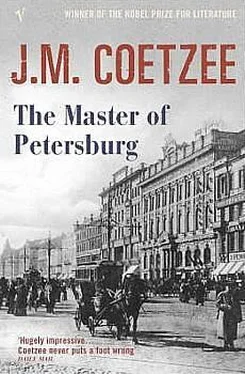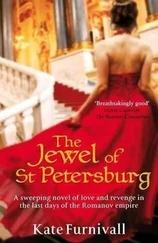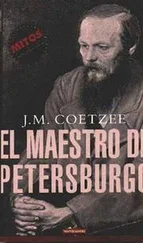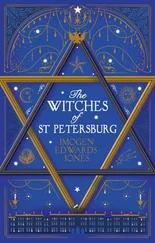July 2, 1867, three months later: 'Liberation of the serf. Free at last! Saw off F. M. and bride at the railway station. Then immediately gave notice at these impossible lodgings he has put me in {own cup, own napkin-ring, and a 10:30 curfew). V. G. has promised I can stay with him till I find another place. Must persuade old Maykov to let me have the money to pay my rent directly.'
He turns the pages back and forth distractedly. Forgiveness: is there no word of forgiveness, however oblique, however disguised? Impossible to live out his days with a child inside him whose last word is not of forgiveness.
Inside the lead casket a silver casket. Inside the silver casket a gold casket. Inside the gold casket the body of a young man clothed in white with his hands crossed on his breast. Between the fingers a telegram. He peers at the telegram till his eyes swim, looking for the word of forgiveness that is not there. The telegram is written in Hebrew, in Syriac, in symbols he has never seen before.
There is a tap at the door. It is Anna Sergeyevna, in her street clothes. 'I must thank you for looking after Matryosha. Has she been any trouble?'
It takes him a moment to collect himself, to remember that she knows nothing about the abominable uses Nechaev has put the child to.
'No trouble at all. How does she seem to you?'
'She's asleep, I don't want to wake her.'
She notices the papers spread out on the bed.
'I see you are reading Pavel's papers after all. I won't interrupt.'
'No, don't go yet. It is not a pleasant business.'
'Fyodor Mikhailovich, let me plead with you again, don't read things not meant for your eyes. You will only hurt yourself.'
'I wish I could follow your advice. Unfortunately that is not why I am here – to save myself from hurt. I have been going through Pavel's diary, and I came to an incident that I remember all too well, from the year before last. Illuminating, to see it now through another's eyes. Pavel came home in the middle of the night incapable – he had been drinking. I had to undress him, and I was struck by something I had never noticed before – how small his toenails were, as though they had not grown since he was a child. Broad, fleshy feet – his father's, I suppose – with tiny nails. He had lost his shoes or given them away; his feet were like blocks of ice.'
Pavel tramping the cold streets after midnight in his socks. A lost angel, an imperfect angel, one of God's castoffs. His feet the feet of a walker, a treader upon our great mother; of a peasant, not a dancer.
Then on the sofa, his head lolling, vomit all over his clothes.
'I gave him an old pair of boots, and watched him go off in the morning, very grumpily, with the boots in his hand. And that was that, I thought. An awkward age, though, eighteen, nineteen, awkward for everyone, when they are fullgrown but can't leave the nest yet. Feathered but unable to fly. Always eating, always hungry. They remind me of pelicans: gangling creatures, ungainliest of birds, till they spread those great wings of theirs and leave the ground.
'Unfortunately, that is not how Pavel remembered the night. In his account there is nothing about birds or angels. Nothing about parental care either. Parental love.'
'Fyodor Mikhailovich, you do no good by lacerating yourself like this. If you aren't prepared to burn these papers, at least lock them away for a while and come back to them once you have made your peace with Pavel. Listen to me and do what I tell you, for your own sake.'
'Thank you, my dear Anna. I hear your words, they go to my heart. But when I talk about saving myself from hurt, when I talk about why I am here, I do not mean here in this apartment or in Petersburg. I mean that I am not here in Russia in this time of ours to live a life free of pain. I am required to live – what shall I call it? – a Russian life: a life inside Russia, or with Russia inside me, and whatever Russia means. It is not a fate I can evade.
'Which does not mean that I claim some great importance for it. It is not a life that will bear much scrutiny.
In fact, it is not so much a life as a price or a currency. It is something I pay with in order to write. That is what Pavel did not understand: that I pay too.'
She frowns. He can see now where Matryona gets the mannerism. Little patience with the tearing out of entrails. Well, all honour to her for that! Too much tearing out of entrails in Russia.
Nevertheless, I pay too: he would say it again if she would suffer hearing it. He would say it again, and say more. I pay and I sell: that is my life. Sell my life, sell the lives of those around me. Sell everyone. A Yakovlev trading in lives. The Finn was right after all: a Judas, not a Jesus. Sell you, sell your daughter, sell all those I love. Sold Pavel alive and will now sell the Pavel inside me, if I can find a way. Hope to find a way of selling Sergei Nechaev too.
A life without honour; treachery without limit; confession without end.
She breaks his train of thought. 'Are you still planning to leave?'
'Yes, of course.'
'I ask because there has been an inquiry about the room. Where will you go?'
'To Maykov in the first place.'
'I thought you said you couldn't go to him.'
'He will lend me money, I'm sure of that. I'll tell him I need it to get back to Dresden. Then I'll find somewhere else to stay.'
'Why not just go back to Dresden? Won't that solve all your problems?'
'The police still have my passport. There are other considerations too.'
'Because surely you have done all you can, surely you are wasting your time in Petersburg.'
Has she not heard what he has said? Or is she trying to provoke him? He stands up, gathers the papers together, turns to face her. 'No, my dear Anna, I am not wasting my time at all. I have every reason to remain here. No one in the world has more reason. As in your heart I am sure you must know.'
She shakes her head. 'I don't know,' she murmurs; but in the voice of someone ready to be contradicted.
'There was a time when I was sure you would conduct me to Pavel. I pictured the two of us in a boat, you at the prow piloting us through the mist. The picture was as vivid as life itself. I put all my trust in you.'
She shakes her head again.
'I may have been wrong in the details, but the feeling was not wrong. From the first I had a feeling about you.'
If she were going to stop him, she would stop him now. But she does not. She seems to drink in his words as a plant drinks water. And why not?
'We made it difficult for ourselves, rushing into… what we rushed into,' he goes on.
'I was to blame too,' she says. 'But I don't want to talk about that now.'
'Nor I. Let me only say, over the past week I have come to realize how much fidelity means to us, to both of us. We have had to recover our fidelity. I am right, am I not?'
He examines her keenly; but she is waiting for him to say more, waiting to be sure that he knows what fidelity means.
'I mean, on your side, fidelity to your daughter. And on my side, fidelity to my son. We cannot love until we have their blessing. Am I right?'
Though he knows she agrees, she will not yet say the word. Against that soft resistance he presses on. 'I would like to have a child with you.'
She colours. 'What nonsense! You have a wife and child already!'
'They are of a different family. You are of Pavel's family, you and Matryona, both of you. I am of Pavel's family too.'
'I don't know what you mean.'
'In your heart you do.'
'In my heart I don't! What are you proposing? That I bring up a child whose father lives abroad and sends me an allowance in the mail? Preposterous!'
'Why? You looked after Pavel.'
'Pavel was a lodger, not a child!'
Читать дальше












